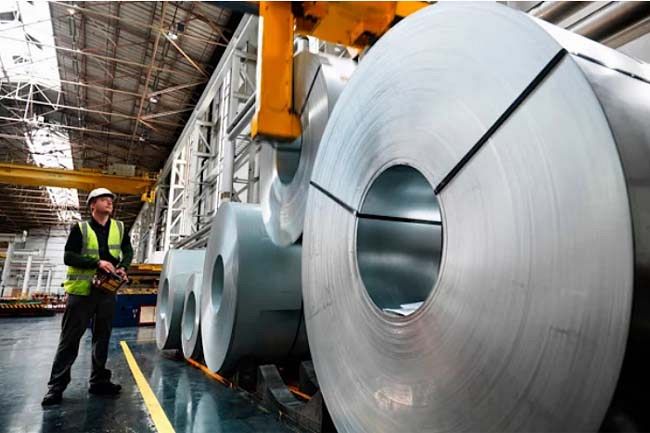Australia’s labour force is changing significantly under Labor and citizens are benefiting greatly, as Alan Austin reports.
THE VALUE OF machinery, transport equipment and other manufactured goods exported from Australia last year was at an all-time high of $44.9 billion. That’s up an impressive 23.1% on the same exports two years ago.
Through its first 21 months managing the economy, the Albanese Government has seen jobs in the manufacturing sector increase by 76,000, which is up 9.1%. Construction is booming as well, with 131,000 jobs added — a lift of 11.0%. The strongest private sector jobs spurt is in agriculture, forestry and fishing, up 14.4% with an extra 41,700 workers.
Those numbers are from the Bureau of Statistics (ABS), whose reports week-by-week confirm that Treasurer Jim Chalmers, Finance Minister Katy Gallagher and workplace ministers Tony Burke and Brendan O’Connor seem to be making the right calls.
The private sector is not the only beneficiary of sound economic management. Another 212,000 workers are engaged in health care and social assistance compared with the number at the May 2022 Election. That’s up 10.4%. There are now 166,000 more community and personal service workers, a rise of 11.1%.
Arguably most impressive of all is arts and recreation which has seen an extra 48,600 creative Australians boost the sector by 21.4% to an all-time high 275,800 contributors. All these expansions enhance the quality of Australian life.
Big picture
Australia is weathering the current global downturn remarkably well, as economists have come to expect of Labor governments.
Overall, the Government has added 789,700 jobs since its election win — well over 1,000 per day. The jobless rate was cut from 3.95% when Labor took office to the 50-year low of 3.45% in late 2022 and settled at 3.70% in February.
Employment is now at record highs for both men and women, with 14,232,300 jobs registered in February.
The participation rate – employed workers relative to population – hit an all-time high in May last year at 66.74%. That was bettered last October with 66.77% and beaten again in November with 66.99%. The latest level for February was 66.70%.
These are all higher than the 66.34% when Labor took office and well above the dismal levels below 65.0% in 2014, 2016, 2020 and 2021 under the Coalition.
Full-time versus part-time
One sneaky way for governments to massage job numbers is to lay off workers who work 40 hours a week and replace each of them with four employees, each doing ten hours. That multiples the number of employed persons by four and reduces the jobless rate accordingly.
That is what effectively happened in 2016 when former Prime Minister Scott Morrison was trying but failing at being Treasurer. Part-time jobs increased by 126,100, while full-time jobs decreased by 17,300.
Since taking office in May 2022, Labor has added 442,100 full-time jobs — many more than the 347,600 part-time jobs added.
Last month’s ABS figures show the ratio of full-time workers to the adult population reached 44.2% in 2023, the highest since the mining boom of 2007 and 2008, just before the Global Financial Crisis (GFC). (See yellow and red chart below.)

Hours worked hit fresh highs
After reaching historic lows several times under the hapless Coalition, hours worked per person have recovered well in the last 21 months.
This is arguably the best measure of the level of employment any economy is generating, as it takes into account full-time jobs, part-time jobs and population shifts.
The average hours worked per Australian adult per month was just 84.3 through calendar 2021, the last full year of the Morrison Government. That rose to 88.4 in 2023, the highest since Kevin Rudd and Wayne Swan generated 89.3 in 2008.
Older Australians still working
One potential area of ongoing concern is the number of workers above the traditional retirement age still working. This jumped alarmingly through the Coalition period, which this column suggested may have been caused by poverty due to inadequate pensions and rising costs.
Instead of declining after Labor took office, as might be expected, the percentage of seniors still working hit 16% for the first time in February. This has now doubled in 18 years.
Of course, other factors may explain this besides poverty. It could simply be that the cohort of academics, administrators and other seniors keen to work in their late 70s has expanded as life expectancy has lengthened. Determining which it is requires further qualitative inquiry, along with continuing analysis of the numbers.
Global comparisons
Australia’s jobs market is particularly impressive as most of the world is on a downward slide on economic outcomes generally and employment in particular. Of the 38 wealthy members of the Organisation for Economic Cooperation and Development (OECD), only four improved jobless rates since May 2022 and kept the percentage below 5%. They are Mexico, Israel, South Korea and Australia. The majority of developed economies now have higher jobless rates than in mid-2022.
Unemployment is above 7% in France, Finland and Italy, higher than 8% in Sweden, Turkey, Lithuania and Chile, and above 10% in Columbia, Greece and Spain.
Australia now ranks ninth on jobs in the OECD, the best ranking since the Gillard Government got Australia into third place at the depths of the GFC.
As reported here last month, Australia is now the only country in the world that enjoys top credit ratings, has both jobless and inflation rates below 4% and has achieved positive economic growth every quarter last year.
Of course, the mainstream media will not report any of this accurately. Its motto is: if you can’t say anything bad about Labor, don’t say anything at all.
Alan Austin is an Independent Australia columnist and freelance journalist. You can follow him on Twitter @alanaustin001.
Related Articles
- Treasurer Chalmers is saving us billions
- Australia's withholding of aid to Gaza a human rights disgrace
- Albanese Government will hope net migration has peaked
- AFR fudges figures to foment anti-Albanese fervour
- Getting away with murder: Time to go after the tax evasion 'sharks'
 This work is licensed under a Creative Commons Attribution-NonCommercial-NoDerivs 3.0 Australia License
This work is licensed under a Creative Commons Attribution-NonCommercial-NoDerivs 3.0 Australia License
Support independent journalism Subscribe to IA.















